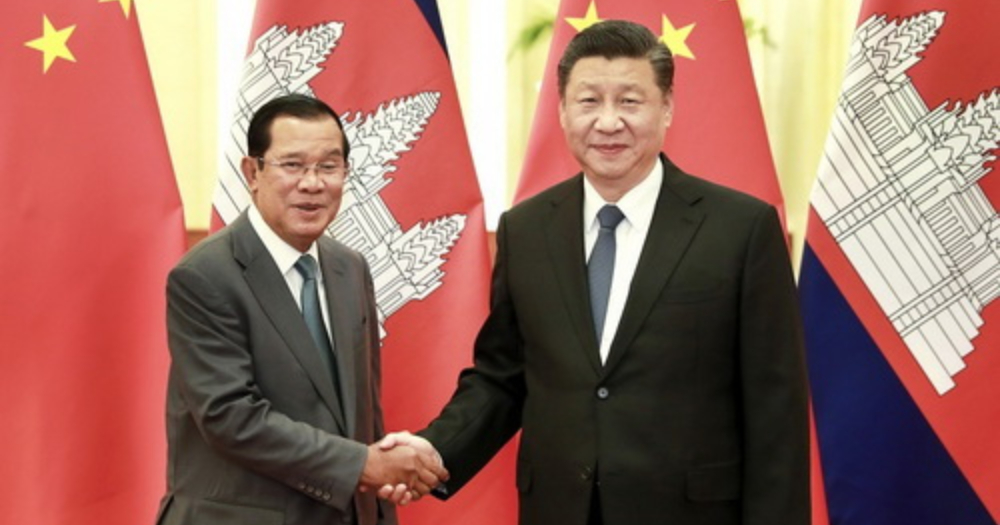Cambodian Prime Minister Hun Sen has hit back at his critics who say he is overly reliant on China for economic assistance, perhaps even to the extent of hurting his own country's sovereignty and national interests.
Hun Sen: Cambodia is no satellite state of China
According to The Phnom Penh Post, Hun Sen denied that Cambodia is a satellite state of China, saying on Wednesday (Oct. 7) that he believes the perception comes from China's assistance in building infrastructure in the country.
He said: “[When] some people see China build roads, provide grants and loans to Cambodia to build roads, they say that Cambodia is a satellite country of China, and that Cambodia chooses China over this superpower or that superpower."
"But I want to ask them – if China doesn’t build this road or this bridge, who builds it instead?” he added.
Hun Sen also said if anyone could prove that other countries besides China could build such infrastructure in Cambodia, he would step down from his position.
He further said while Japan and South Korea have built some roads and bridges, China has built as much as thousands of kilometres of roads in Cambodia.
Diplomatic notes containing Hun Sen's comments have also been sent to all embassies in the country, a spokesperson from Cambodia's foreign ministry said.
Cambodia shunning the U.S. for China?
A 2019 Wall Street Journal report, citing U.S. officials, had alleged that Beijing "signed a secret agreement allowing its armed forces to use" the Ream naval base -- the country's largest -- in Sihanoukville province for 30 years.
Claims of enhanced Chinese military presence in the region are a concern to the United States -- U.S. Vice President Mike Pence sent a letter to Hun Sen in 2018 to express concerns over Cambodia potentially hosting the Chinese military.
Such speculations were fuelled when Cambodia turned down a U.S. offer in 2019 to help repair facilities at the naval base.
It has most recently demolished a U.S.-built facility there, prompting the Pentagon to issue a statement saying they have "concerns that razing the facility may be tied to Cambodia government plans for hosting People’s Republic of China military assets and personnel" at the base.
Cambodia has demolished a U.S.-built facility at the country’s Ream Naval Base, according to satellite imagery collected on October 1. The demolition seems to confirm that changes are underway at Ream and raises questions about rumored Chinese access: https://t.co/C1w5qeqneU pic.twitter.com/HU7E5K11kJ
— AMTI (@AsiaMTI) October 2, 2020
Hun Sen repeatedly denied accusations of exclusive Chinese access to naval base
Hun Sen had denied the accusations of Chinese exclusive access repeatedly, saying in June this year that "other countries' warships" are allowed to dock if "one country's warship is allowed", AP reported.
"We are not going to close it to anyone," he said.
Hun Sen also questioned how having a base in Cambodia would benefit China.
But analysts have opined that basing rights in Cambodia would allow Beijing to expand its strategic influence in the area significantly, potentially affecting the balance of power in a region where countries prefer an American presence to counterbalance against Chinese influence.
Ankit Panda, editor-at-large at The Diplomat, also opined that the Ream naval base, with its proximity to Vietnam, can allow Chinese naval ships to respond quicker in the waters off Vietnam's coast.
Tensions between Vietnam and China have grown over the years due to overlapping claims in the Paracel and Spratly Islands in the South China Sea.
Hun Sen's close ties to Beijing
China is Cambodia's largest investor, accounting for 70 per cent of the Southeast Asian country's foreign direct investment, while Japan and Vietnam come next.
In 2018 alone, China has poured almost US$3.6 billion (S$4.9 billion) into the country -- much of it spent on infrastructure building.
Hun Sen, who has governed Cambodia for 35 years, has gained political backing from China by forging closer ties with it amid growing censure from the United States and Europe over his governance and human rights track record.
Out of the 10 Asean member countries, Cambodia can be said to be one of the few who are most friendly towards China.
Its alignment with China became clear in 2012 when it prevented Asean from issuing a joint communique that mentioned rising tensions in the South China Sea -- it blocked a joint statement for a second time in 2016, resulting in a watered down statement that avoids offending China.
Even as the country closed its borders to citizens of five Western nations -- Germany, Spain, Italy, France and the U.S. -- in March, it carried on with military drills with thousands of Chinese soldiers.
And despite the rising number of Covid-19 cases in China, Hun Sen had also resisted calls to pass a travel ban on Chinese nationals.
In addition, he made a visit to Beijing to meet with Chinese President Xi Jinping in February at arguably the height of the lockdown in the country -- the first visit by a foreign leader since the virus outbreak.
Totally unrelated but follow and listen to our podcast here
Top image via Xinhua
If you like what you read, follow us on Facebook, Instagram, Twitter and Telegram to get the latest updates.
